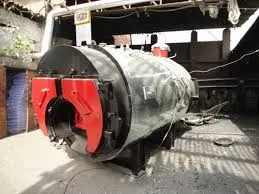
Sep . 22, 2024 15:05 Back to list
steam boiler system
Understanding the Steam Boiler System An Essential Element in Industrial Operations
A steam boiler system is a crucial component in various industrial operations, serving as the foundation for steam generation and distribution. This system converts water into steam by applying heat, primarily serving heating purposes and powering a range of mechanical processes. The importance of steam boilers in industries such as food processing, power generation, pharmaceuticals, and chemical manufacturing cannot be overstated.
At its core, the steam boiler system operates on the principle of thermodynamics. Water is heated in a closed vessel, and when it reaches its boiling point, it transforms into steam. The generated steam can then be used directly or indirectly to drive machinery, maintain temperature, or facilitate chemical reactions. Different types of boilers, such as fire-tube, water-tube, and electric boilers, cater to varying industrial requirements. Each boiler type has its advantages and is selected based on parameters like efficiency, pressurization needs, and fuel type.
The efficiency of a steam boiler system is paramount, as it directly impacts operational costs and environmental footprint. Modern boilers incorporate advanced technologies to improve combustion efficiency and minimize emissions. For instance, condensing boilers recover heat from exhaust gases to pre-heat incoming water, significantly enhancing overall efficiency. Regular maintenance and timely inspections also play a critical role in maintaining boiler performance and prolonging its lifespan. This includes checking for leaks, ensuring proper pressure levels, and monitoring for scaling or corrosion within the water tank.
steam boiler system

An important aspect of steam boilers is their safety. High-pressure steam can be dangerous, and thus, safety mechanisms are implemented to minimize risks. These include pressure relief valves, water level controls, and emergency shut-off systems, which ensure safe operation under various conditions. Compliance with regulations set by bodies like the American Society of Mechanical Engineers (ASME) and the Occupational Safety and Health Administration (OSHA) is also essential for maintaining safety standards in boiler operations.
Furthermore, the integration of automation and monitoring technologies has revolutionized steam boiler systems. Automated controls can manage water levels, steam pressure, and fuel supply, enhancing both efficiency and safety. Real-time monitoring systems can detect anomalies, allowing for predictive maintenance and reducing unexpected downtime. This technological advancement not only leads to operational efficiency but also ensures a more sustainable approach to resource consumption.
In summary, the steam boiler system is a vital infrastructure element in numerous industrial settings. Its ability to generate and distribute steam efficiently is crucial for heating processes, driving machinery, and supporting various production activities. As industries continue to evolve, embracing advancements in technology while adhering to safety and regulatory standards will be essential for optimizing boiler performance and ensuring sustainable operations. Investing in modern steam boiler systems allows companies to maintain their competitive edge while contributing to energy efficiency and environmental conservation.
-
High-Efficiency Gas Thermal Oil Boilers | HPT Models
NewsJul.31,2025
-
Oil Fired Hot Water Boilers Sale - High Efficiency & Affordable
NewsJul.31,2025
-
High-Efficiency Commercial Oil Fired Steam Boiler for Industry
NewsJul.30,2025
-
High-Efficiency Biomass Fired Thermal Oil Boiler Solutions
NewsJul.30,2025
-
High Efficiency Gas Fired Thermal Oil Boiler for Industrial Heating
NewsJul.29,2025
-
High-Efficiency Gas Fired Hot Water Boiler for Sale – Reliable & Affordable
NewsJul.29,2025
Related PRODUCTS






















